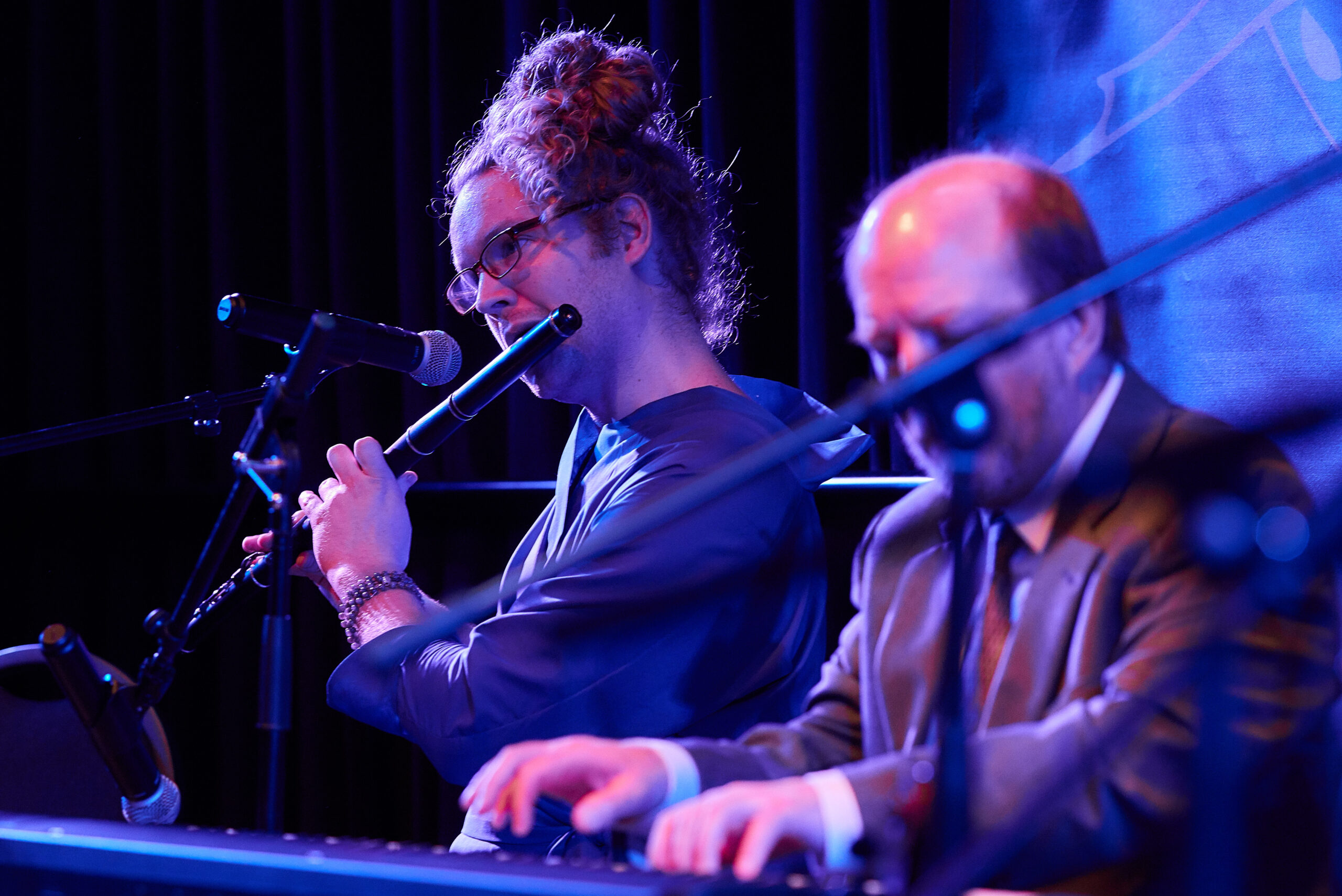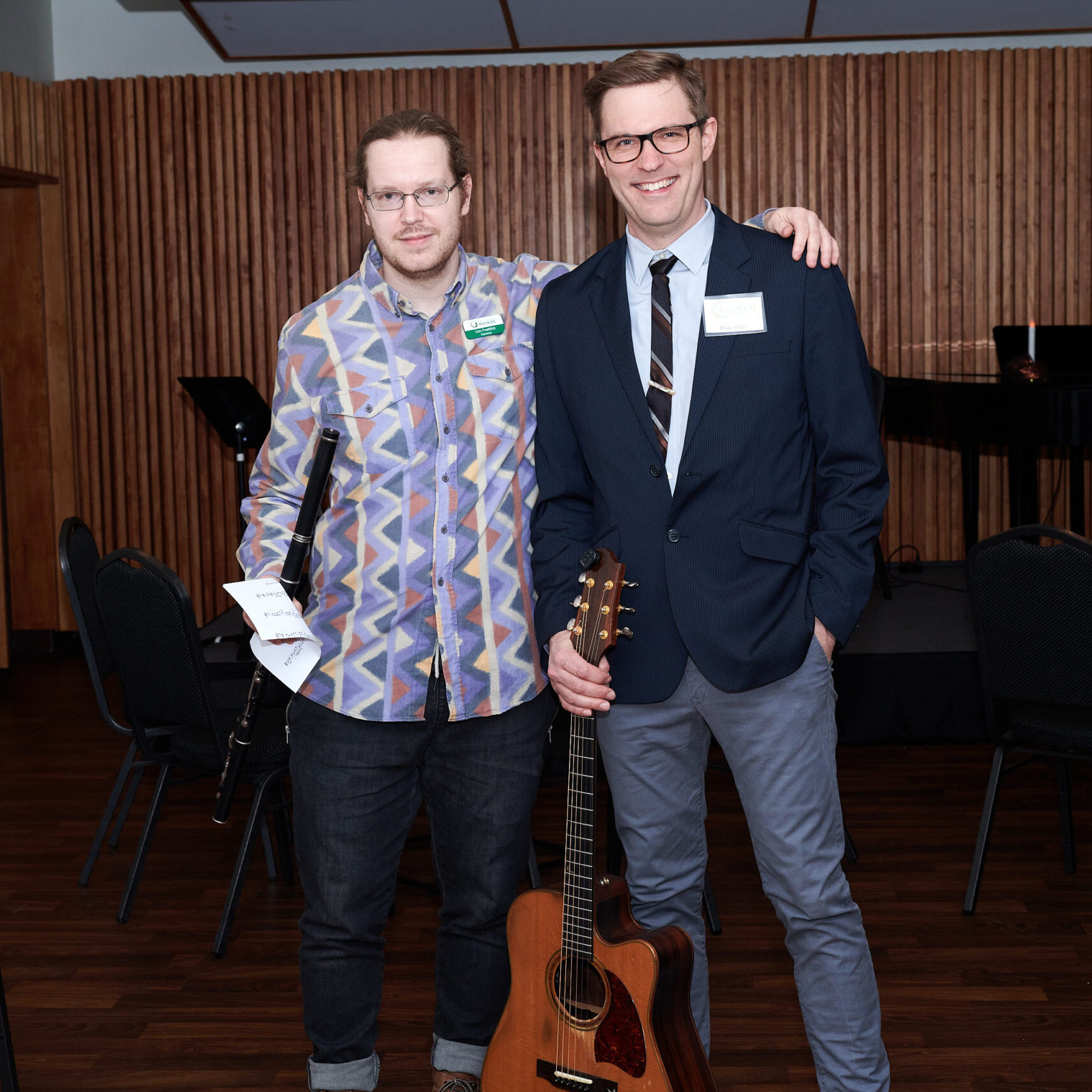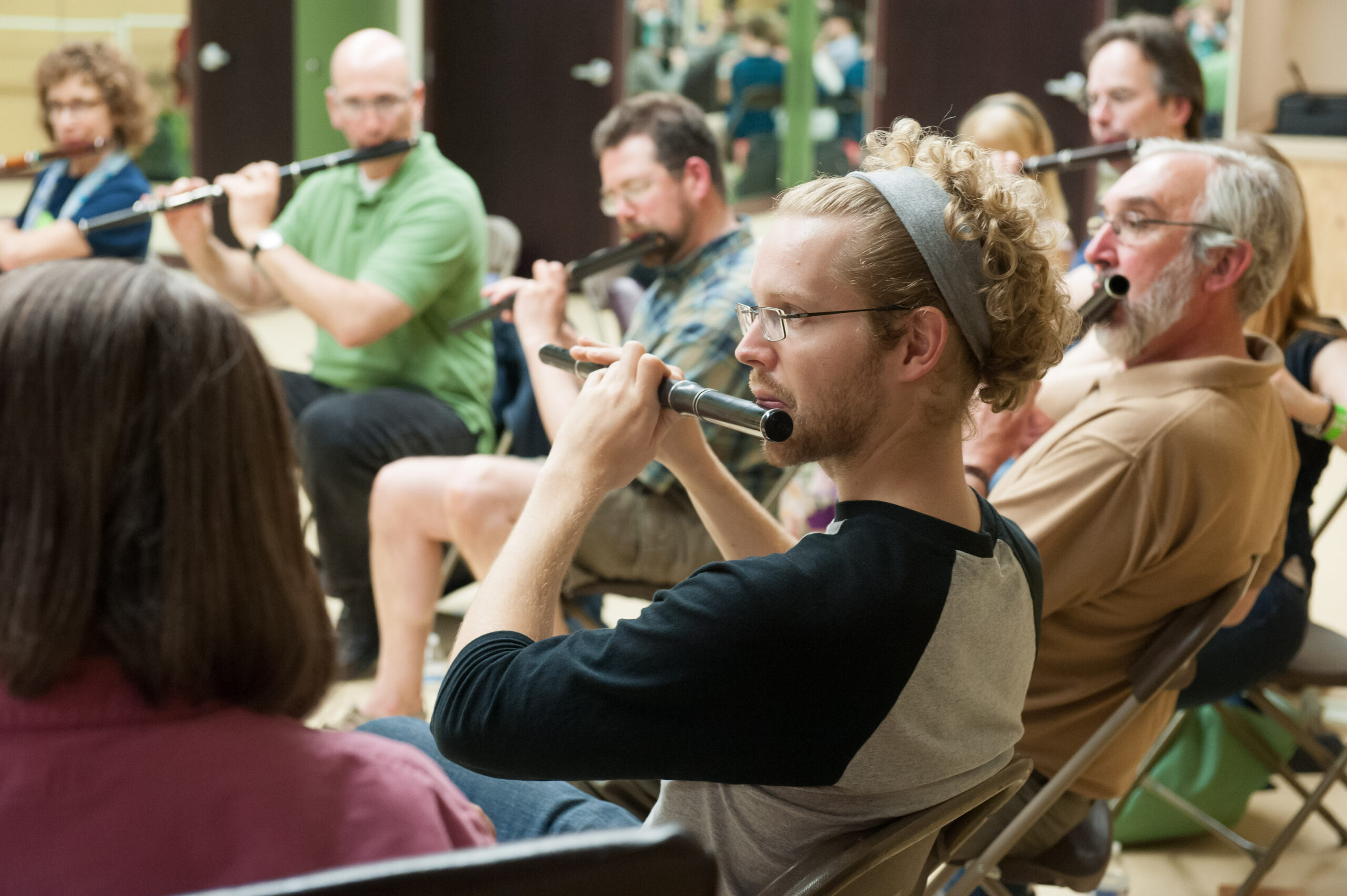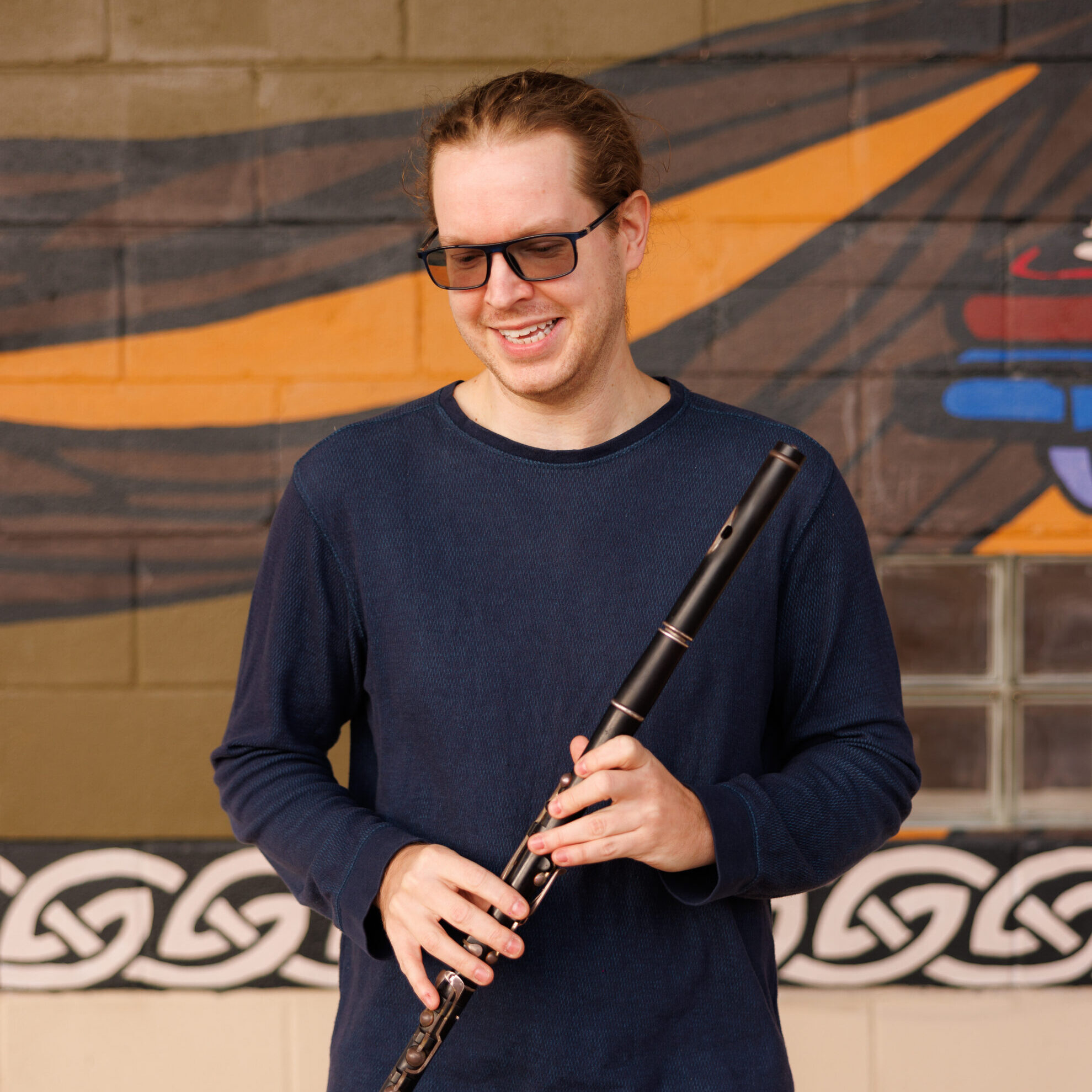June 20, 2024
This interview is part of the Center for Irish Music's story-sharing project, "Many Paths to Handing Down a Tradition." Click here to learn more!

Cory performing alongside fellow instructor Sean Egan at Éigse CIM, a Gaela Event in 2018.
A recurring theme in many of our stories is the power of connections, community, and kindness to keep us going in our own music journeys. Cory Froehlich’s story is a powerful one to remind us of the people we get to meet and build deep relationships around the way.
We are delighted to bring Cory's story to you.
Sook Jin: Cory, how wonderful to be here with you today. Let’s begin with a story of your earliest memory of traditional Irish music.
Cory: I was born in Canada to a Canadian dad and an American mother. As a little kid, we lived in Canada, where it was common for smaller towns to have a municipal Highland pipe band. Growing up, we would go to parades, and I was so fascinated by the bagpipes. My earliest memory was watching the Moose Jaw Pipe Band playing.
When I was five, my parents divorced, and I moved to my mom’s hometown of Bemidji Minnesota, where I grew up. When I was nine, I really wanted to learn the bagpipes, so my dad sent me a practice chanter in the mail for my birthday. Around that time, a man by the name of John Egelhof moved to Bemidji. He was a former piper with the New York Police Pipe Band, and moved to Minnesota to take a position with the regional FBI division. The local community music school, Headwaters School of Music and the Arts, reached out to John to see if he would like to teach pipes. So, I took lessons at the age of 10.
I was looking to purchase a full set of highland pipes the following year, but then Riverdance got big from Eurovision, followed by the movie Titanic, and I was drawn especially to the steerage part scene with Gaelic Storm. The soundscape stuck with me, and I was hooked on Irish music.
My mom took note of this interest. In the 90s, Target Corporation used to issue their own music CDs called Lifescapes, oftentimes featuring instrumental music like jazz or ambient. They had a Celtic CD in the collection, organized by our very own Laura Mackenzie, featuring many local musicians we all know. Laura herself played a whistle solo near the beginning of the album, and I was so captivated I thought, “I like this better than the bagpipes!” I then started learning the whistle mostly from the Clarke Tin Whistle Tutor (the book and cassette!).
Sook Jin: What a cool connection from the get-go! How did this love for Irish music grow and lead you to the Center for Irish Music?
Cory: Brian Miller is a key reason for the connection. Growing up in Bemidji, I was there during a time where the arts were flourishing because of an influx of philanthropy monies supporting the arts in rural spaces. There is a little summer stock theater called the Paul Bunyan Playhouse, where I spent my summers as a theater kid. Brian, and two of his friends, played as a trio for intermissions. I would go out just to watch them play. Brian was an important person to me because he was an older role model, who was making headways into traditional music, and who hailed from the same town.
I was taking lessons at the local music school at that point, and the director of the school had a son who was the same age. We roped in another friend to join us as our fiddler, and the three of us did our own mini-trio thing during middle school.
After I graduated, I moved to the Twin Cities. It took me a while to get settled, but I finally reached out to Brian after about year to check on the local session scene. I started attending as many sessions as I could, ones in different pubs, people’s kitchens, rapid-learning the local repertoire, meeting and spending time with local players.
Norah (Rendell) at one point approached me and asked if I would like to lead Celtic Cuties in her absence for her upcoming maternity leave. That then led to teaching private lessons, up to this very day!

Cory with fellow instructor and Bemidji native Brian Miller.
Sook Jin: Your stories include so many of those who are key in your journey. Who has been part of your journey?
Cory: I have so many! Brian Miller is someone I considered a mentor. Many of those I’ve named earlier, too. There are also players whose recordings I spent a lot of time with in my formative years - for example, Joannie Madden’s albums and also Mary Bergin’s. I listened to it so much, played along with the tunes by heart, I can still remember them till this day. I’ve now met Joannie several times since and she has been very gracious about my playing, which has been a tremendous honor and sense of validation for my hard work over the years.
I do have a good story about the piper, whistle, and flute player Bill Ochs. Bill was part of the original Green Fields of America activities, spent much time in Ireland beginning in the early 70s, and was a highly respected flute and whistle player and piper. I had a black glossy pamphlet that came with my Clarke whistle, plus a cassette, and spent hours absorbing the whole thing - types of tunes, ornamentation. When I was a senior in high school, we went on a J-term trip to New York to study the Harlem Renaissance. John Egelhof, whom I mentioned earlier, being from Staten Island, was actually one of our chaperones. I found out that Bill, who wrote the Clarke Tin Whistle Tutor, had a studio in Greenwich Village. I took the subway for my hour-long lesson. Bill said to me, “why don’t you take your flute out and play something for me?”. I decided to play a five-part version of the reel The Mason’s Apron - the one Matt Malloy played on the Chieftains live from Belfast album. After I was done, he sat back with a look that made me nervous. He said, “Well, that was fantastic. What do you want to work on? I don’t think there’s really much technique-wise I have to teach you.”
I told him that the reason why I wanted a lesson with him was that on the back of the Clarke Tutor booklet, there was an advertisement from the Penny Whistler’s Press, for the album Ireland’s Whistling Ambassador - Micho Russell—which Bill has produced, I believe. I was so excited to get the CD when it arrived, but I was initially disappointed with the playing I heard. “I don’t get it.”
Bill cracked up, and asked if I had ever tried to play along with Micho, to which I said no. Bill went into his office and reemerged with about 20 pages of printed music - mostly from Micho Russell, but also Michael Tuburidy, Mike Rafferty, and some other players - profoundly detailed transcriptions with phrase markings, and so on. He had me play one of the tunes and to follow the phrasing and ornaments - I think it was Four Courts of Dublin - and then it clicked for me. He was like the Mr. Miyagi of Whistle playing (from the old Karate Kid movies), and the subtle genius of Micho Russell suddenly made sense. Our lesson ended up going on for two hours.
I was elated, and left only to realize I forgot to pay him. So, I walked back to his apartment to hand him the check. “I’m sorry I only have a check for one hour.” He said he would refuse to take any more, and it was his pleasure to spend that time with me. That influenced the way I approach my lessons with my students. I love giving my students my time, because of the love of this music. Bill taught me to listen deeply to the nuances that might not come across as fireworks, but are pure heartfelt expressions.

Cory in a workshop with fellow flute-players during the 2014 Minnesota Irish Music Weekend.
Sook Jin: How has Irish music shaped/impacted the way you think of yourself?
Cory: Irish music brought me a lot of close relationships that shape how I experienced the world, even as a young person. The kindness, the connection, how people treat each other. One story was back to sixth grade (during the mini-trio era), going back to Anne Hayes, the artistic director of the community music school. She was in a Celtic band. I remember calling her up one day, telling her I would like to learn how to play the bodhrán. She told me about Pat Ryan, who played bodhrán in her band, Fair Winds. “Why don’t you give him a call?” I did, and had a great chat with him. Turns out, he called my mom after that, and they worked out a plan to get me a starter bodhrán - one of those Trinity College models. I would never forget coming home from school one day to find a big cardboard box in the living room. I just was so overwhelmed by it. And half an hour later, the doorbell rang, and Pat Ryan was there to give me some basics on how to play the bodhrán.
It became a sad tale shortly after, because Pat was killed in a tragic train accident a year or so later. That hit me hard - it was a first major loss I had in my life that I could recall. But I would never forget how Pat, and so many others, like Bill, John, over and over again, in my Irish music journey, have treated me, this young curious artsy kid from Bemidji, with so much kindness and support.
Sook Jin: How have your identities and life experiences shaped your Irish music journey?
Cory: Irish music has been a huge part of my life - going on 25 years now. And still, I feel like an outsider at times because I am not Irish, and I want to be thoughtful in how I teach, play, and present myself in the Irish music community. I think it’s that outsider-ness to it that keeps me humble and always curious to learn more. I only begrudgingly acknowledge any of my own expertise in it, because I owe so much of this to the connections I was lucky to make over the years.
My dad's side is 100% German and my mom's side is half Finnish and half Swedish and so that's what I have. And yet, how lucky is it that this kid who grew up in Bemidji gets to learn this fantastic music!

I happen to be gay, came out in middle school, and that was still a tough era to be a gay kid. My friends realized it before I did - and I kinda got abandoned by my friend group over it - so I just sat in my basement with my tin whistle, with Joannie Madden’s albums on cassette, and I wore them out learning everything I could.
I do enjoy performing. I was a theater kid, but I was never the showboat. I would much rather sit behind a piano and not say much on stage. And that is why I am drawn to Irish music, to play together, to be supportive, to make it beautiful and musical. I recall in opera, which I studied in college, there was a saying from old opera singers about never letting a non-musical note come out of your mouth. I think that musicality crosses boundaries, and that’s why really musical players like Micho Russell struck a chord with me.
Sook Jin: How do you envision your contribution to the traditional Irish music community?
Cory: I really love teaching, and it was something I never thought or planned on doing. My students shared that they love my approach. I think it’s because I am an outsider to this tradition, growing up without any “given’s”, and having to learn a lot of this from all the people I have been so lucky to meet, it has been a conscious process. It helps as a teacher to be able to explain it, as a transplant to this music, even if I have been playing it for 2.5 decades!
I have had the privilege of knowing many great players as well, and often get invited to house sessions where we play in a smaller intimate setting. You can get a lot out of that. I try to give back what I learn from those spaces to my students.
I love learning. I bring that continued curiosity to learn. Dáithí (Sproule) has been very generous with his time and instruction over the years. After meeting and playing in some sessions together when I first started going to them here in Minneapolis, I asked him if he’d teach me some Irish language songs. He invited me to the small Irish language study group he ran around his dining room table at the time, and also occasionally to come learn a song or two from him.
Similarly with Marty McHugh. We were quite close for a number of years, and I might have some of the only living room recordings of Marty singing full songs. Someone - might have been John McCormick or Laura Mackenzie - mentioned that Marty never would really sing whole songs, just a verse or two to be cheeky. I was spending a lot of time hanging out with Marty, so one afternoon, I had my laptop with me and asked if he’d be open to leaving the recording on in the background, with no pressure to sing any songs. Next thing I knew, he sang a few. I believe I shared that recording with Brian Miller - I no longer have mine - but it was a reminder of how lucky I am to know people like Marty who treated me with kindness, generosity, and friendship.
Sook Jin: What excites you about where you are in your Irish music journey?
Cory: I would love to play out more if scheduling and transportation were not an issue. I love seeing all the new people locally that are getting into Irish music. The music is always in my head, and I love the balance between playing, teaching…but also like having the stability of a day job.
Sometimes I thought I might want to make a living out of just Irish music, but what I have learned from many others is that you can do something else as a career and still be a great Irish musician. We have people who are engineers, lawyers, teachers, construction workers, etc., and they keep showing up for the love of Irish music and they take it seriously. That is such a wonderful thing about our Irish music community - there are so many ways of being a part of it.
